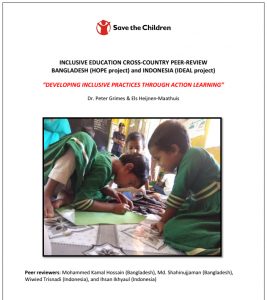In this blog, Peter Grimes and Els Heijnen-Maathuis tell us about an innovative monitoring and evaluation approach for Save the Children’s inclusive education programmes, using peer review rather than external evaluation consultants.
You can find out more in the full report (PDF 1.7mb): Developing Inclusive Practices through Action Learning: Inclusive education cross-country peer review Bangladesh and Indonesia
The cross-country peer review established a strong link between the two projects. The project teams identified areas for continued collaborative sharing and learning such as for inclusive education documentation, improving their project exit strategies, and examining a CBR approach that moves towards Community-Based Inclusive Development.
Peer review rather than evaluation
To understand and describe what is changing in ‘our’ inclusive education projects in different countries, Save the Children carried out a cross-country peer review in Bangladesh and Indonesia. The documented peer review actively engaged professional colleagues or peers from another country in a critical review of project activities, ‘assessing’ what has worked well (or not) and why. The aim was not to judge but to improve and help each other enhance the quality of the collective contribution to inclusive education. This process of collaboratively sharing and reflecting as part of everyday practice led to improved problem solving, capacity building and professional learning opportunities based on similar experiences in a different context.
Facilitators or ‘critical friends’ instead of unknown consultants
Two facilitators or ‘critical friends’ were involved as a reflective sounding board for the two country teams. Both facilitators were considered trusted persons who could provide technical support during the peer review process but also ask challenging questions, suggest reframing of approaches, provide information to be examined through another lens and offer critiques or commentaries as friends.
“The peer review has helped us to ask more and better questions and not be satisfied with just knowing that we are reaching more children with disabilities in the communities.”
The two country-teams identified strengths and challenges in each other’s projects; collected information about the situation prior to the project and the current situation; highlighted good practices for replication and suggested ideas for improvement to each other. Some of the issues both country teams reflected on, discussed and tried to find better solutions for were:
- how to address the lack of accurate data on children with disabilities;
- how to support teachers to provide quality education for all children;
- how to influence a highly centralised education system more effectively.
Empowered national staff
The cross-country peer review was experienced by both country teams as a very useful, enriching and empowering experience. They realised they were not alone with their challenges and together generated new knowledge and ideas. It has worked out as a dialogue between the two countries to better understand conceptual and operational aspects of the projects and thus learn from both successes and failures.
Future peer reviews
Learning from this experience, future peer reviews may need more in-country time for each review visit. Instead of mostly distance support from facilitators or ‘critical friends’, it would be better for these supporting experts to be with the teams during the in-country peer reviews, to improved understanding of the review process, especially when developing the tools and for post-review evaluation.
Read the full report of the peer review process and findings: Developing Inclusive Practices through Action Learning: Inclusive education cross-country peer review Bangladesh and Indonesia (PDF 1.7mb)

